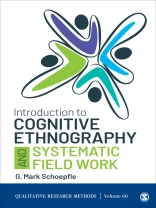Introduction to Cognitive Ethnography and Systematic Field Work by G. Mark Schoepfle provides a guide to the fundamentals of cognitive ethnography for qualitative research. A focus of this technique is collecting data from flexible but rigorous interviews. These interviews are flexible because they are designed to be structured around the semantic knowledge being elicited from the speaker, not around some pre-conceived design that is based on the researcher’s background, and they are rigorous because the basic linguistic and semantic structures are shared among all cultures. Written by one of the founders of this technique, this text provides a wealth of concentrated knowledge developed over years to best suit this collaborative and participant-centric research process.
Eight chapters show how intertwined data collection and analysis are in this method. The first chapter offers a brief history and overview of the cognitive ethnography. Chapter 2 covers planning a research project, from developing a research question to ethics and IRB requirements. The next two chapters cover interview background, techniques, and structures. Chapter 5 addresses analysis while Chapter 6 covers transcription and translation. Chapter 7 covers observation, while a final chapter address writing a report for both consultants and outside audiences.
Table of Content
Preface
CHAPTER 1 • Orientation to Ethnography and Cognitive Ethnography
Ethnography
Material Culture and Cultural Durability
Kinds of Ethnography
Abductive Reasoning in Cognitive Ethnography
How Ethnography Differs From Journalism
Everyone Is Biased and Must Cope With the Fact
Preparation for an Ethnographer’s Career: Ethnographer as Expert Witness
CHAPTER 2 • Planning and Proposing a Research Project
The Proposal
The Parties Involved: Peer Review and Institutional Review Boards
CHAPTER 3 • The Semantic Unity of the Ethnographic Interview
The Lexical-Semantic Field Theory and the MTQ Schema
Specialized MTQ Interview Techniques
CHAPTER 4 • The Natural History of the Ethnographic Interview
The Natural History of the Interview
Grand-Tour and Mini-Tour Questions About People Through Personal Networks: The Crystalized Structure of a “Snowball Sample”
CHAPTER 5 • Ethnographic Analysis With Complex Logical-Semantic Relationships
Enhancing MTQ Analyses
Analysis of Complex Semantic Relationships
Ethnographic Decision Models: Entering Choice Into VAPs
Applying Decision Models in Cognitive Ethnography
CHAPTER 6 • Language Transcription and Translation
Interview Transcription
Interview Translation
CHAPTER 7 • Observation
Proposed Justifications for Sole Reliance on Observation
Kinds of Observation
The Application of Photography to Interview and Observation
Observation and Evidence
CHAPTER 8 • Writing the Ethnographic Report
Four Major Report-Writing Styles: Descriptive, Analytical, Synthetic, and Case Study
When Schema Are Not Available or Have Not Been Generated
Organizing the Report
A Final Word on Native Coresearchers
References
About the author
G. Mark Schoepfle has devoted his entire career to applied anthropology in federal and tribal government, with an adjunct status in various academic institutions that have often helped support this research. He received a bachelor’s degree in anthropology from the University of California, Berkeley, in 1968. Following his military service, he received his Master’s in 1972 and Doctorate in social anthropology 1977 from Northwestern University, under the anthropological linguist Oswald Werner, his dissertation chair. His employment in anthropology began with the Navajo Tribal Division of Education. Here, under the supervision of Oswald Werner, he helped train and supervise Navajo researchers, and compile ethnographic reports of the Navajo Nation’s different school systems. What began originally as involvement with a one-year training and research project evolved into a 14-year research and teaching career on the Navajo Nation. It involved both research and training Navajos as active research participants and analysts, co-publishers, and findings presenters. Beginning in 1974, he was involved with Oswald Werner in developing a researcher’s training manual that finally became the two-volume Systematic Fieldwork published in 1987. From 1980 to 1984 he also served as Deputy Director of the Northwestern University Summer Field School in Ethnography. In 1988 he shifted his career interests to auditing and evaluation at the Government Accountability Office, and later the Department of the Interior in Washington, DC. At the Department of the Interior, he has served as cultural anthropologist for the National Park Service’s program in applied ethnography, and at what is now the Office of Federal Acknowledgment.












